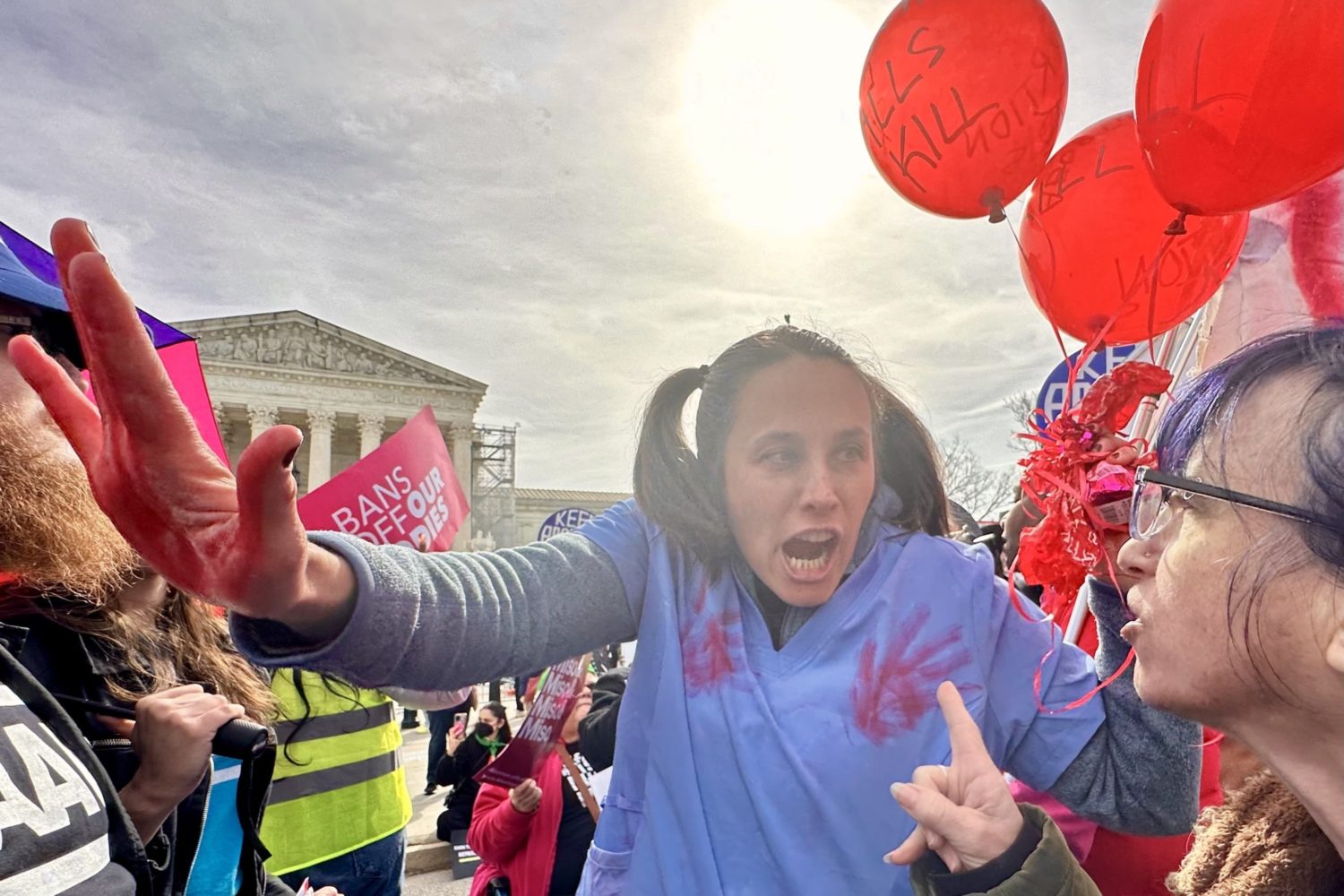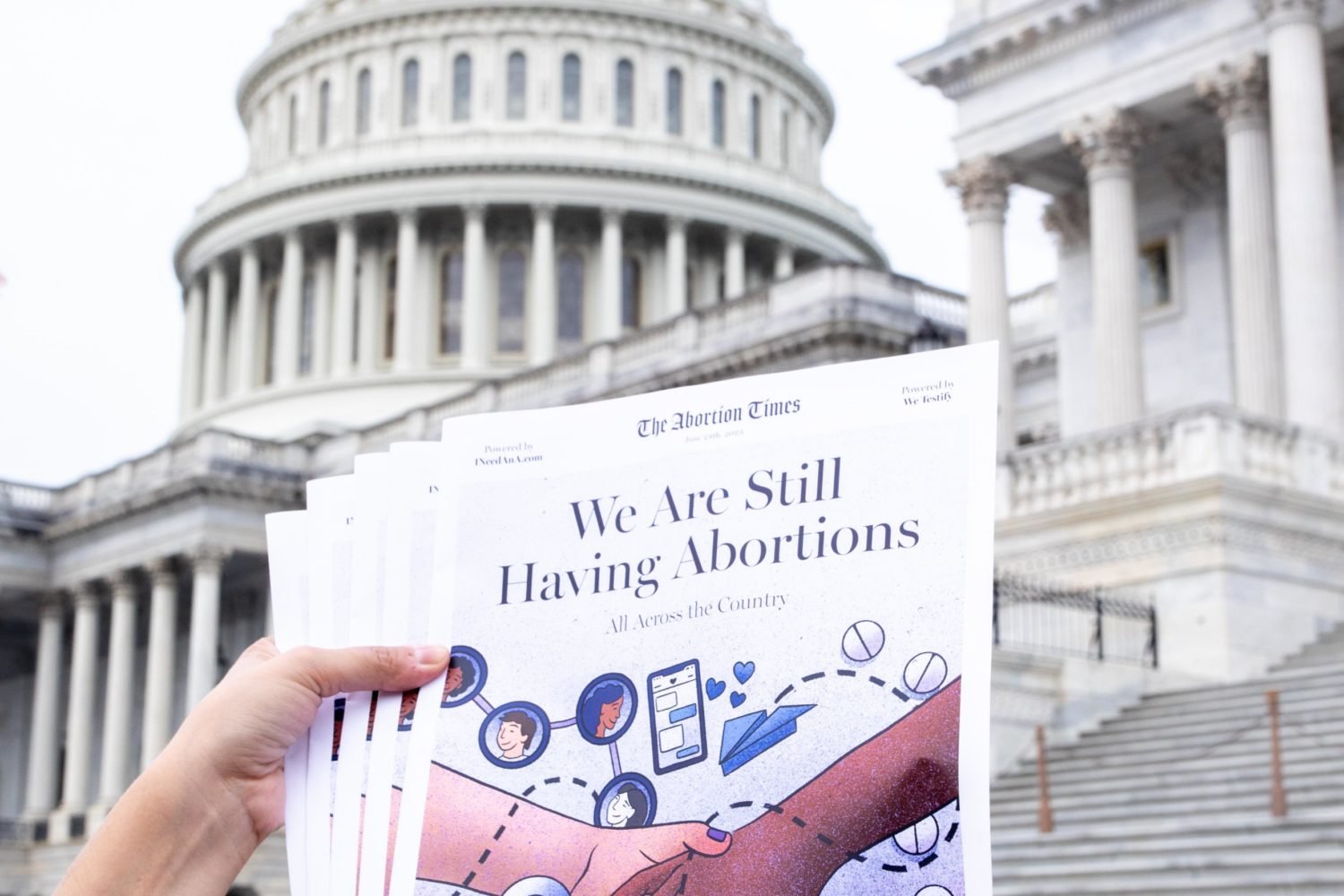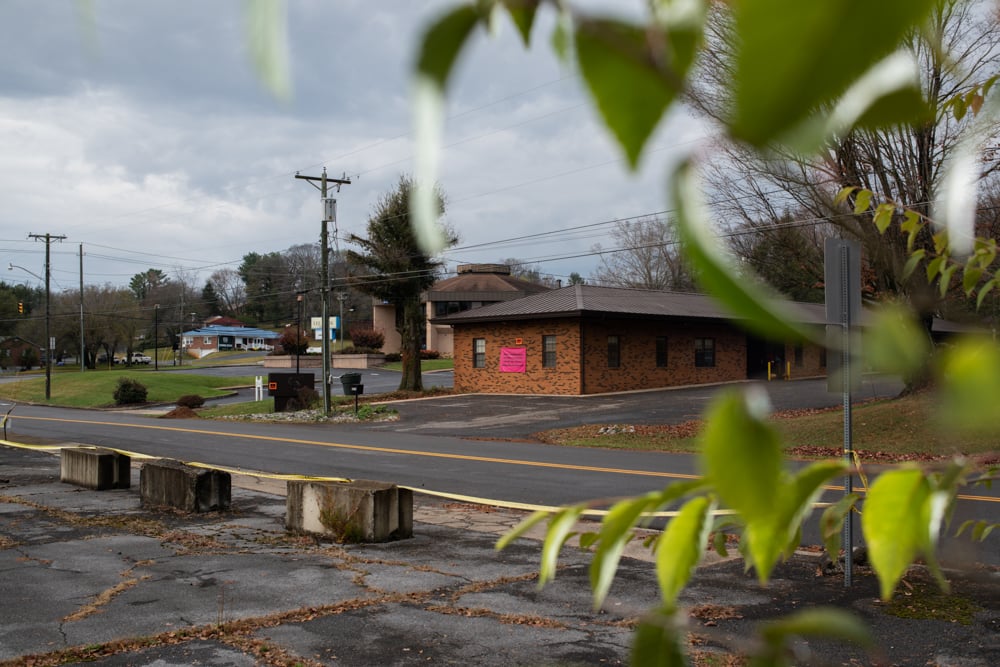This story was reported before the Supreme Court’s landmark decision in Dobbs v. Jackson Women’s Health Clinic, which struck down Roe v. Wade on Friday.
Back in January, Hayley McMahon was volunteering outside of a DC reproductive health clinic when she noticed something unusual: “There were folks sort of walking beyond the clinic boundaries,” she says. “They were going all the way up and down both sidewalks, which I’ve never seen anyone do before. It made me think they were checking the perimeter for other entrances.” Unsettled, McMahon reported this to a supervisor and finished her shift as usual. But the next day, she says, those same people—a group of anti-abortion activists—blockaded the clinic door with their bodies, preventing patients from going inside.
For four-and-a-half years, McMahon has been a volunteer clinic escort, shepherding patients to and from appointments (some for abortions, others for procedures like pap smears), so she’s accustomed to disruptive behavior. She says that anti-abortion protesters frequently “chase patients down and try to give them pamphlets,” “get into patients’ faces and scream at them,” or “corner a patient’s male companion and tell him things that are just blatantly untrue, like ‘Your partner could die, and they may never be able to have a baby again.’ ”
Nonetheless, McMahon found the January blockade surprising. To her, it felt like an escalation, a sign that anti-abortion activists feel “emboldened” as reproductive rights are rolled back nationwide.
In Washingtonian’s interviews with five volunteer clinic escorts, two abortion doulas, and two clinic staffers (all of whom are connected to clinics in the region), most shared McMahon’s feeling that the size and tenor of clinic protests have escalated in recent years. This perception is borne out in the data: for more than 40 years, the National Abortion Federation (NAF) has been tracking anti-abortion violence and clinic disruptions; lately, the organization says it has seen an increase in “harassment, intimidation tactics, and other activities aimed at disrupting [abortion] services.”
This is likely because abortion has been so prominent in the news. A woman named Diane, who has been an administrator and patient counselor at Hagerstown Reproductive Health Services since 1981, says that during her 40-year career, she has noticed more fevered activity outside the clinic “any time there’s a national or statewide event that relates to abortion—you know, appointing a Supreme Court justice, that sort of thing.” (For safety, Diane asked to use only her first name.)
President Trump’s appointment of three pro-life Supreme Court justices, the 2019 wave of statewide abortion restrictions, and the 2021 passage of Texas’s restrictive abortion law are a few recent events that some local escorts and clinic staff say whipped up protesters.
Of course, higher-profile than any of these is the Supreme Court’s ruling in Dobbs v. Jackson Women’s Health Clinic, which struck down Roe v. Wade on Friday. NAF fears that this will cause bigger, more aggressive clinic protests—both because activists may feel invigorated, and because there will be fewer clinics to protest as state laws shut them down. In the same way that patients will likely converge on the remaining clinics, advocates fear that protesters will, too. NAF says this “will only add to the current upward trend” in harassment and disruption of care.
The current wave of anti-abortion activity may date back to 2015, when activists released a series of misleading videos suggesting that Planned Parenthood sells fetal tissue for profit. After those videos appeared, NAF’s data shows that hate speech and death threats spiked, clinic blockades nearly doubled, and suspicious packages quadrupled. Then, in November of that year, a religious extremist invaded a Planned Parenthood in Colorado Springs and shot 12 people, three of them fatally.
Since then, most of NAF’s key metrics have remained elevated, but clinic picketing—which is NAF’s term for protesting at clinics—stands out among them. After tripling to 21,715 reported incidents between 2014 and 2015, picketing has since continued to climb: In 2021, NAF recorded 114,093 picketing incidents.
Picketing also seems to have grown more aggressive. Between 2020 and 2021, NAF’s data shows assault and battery outside clinics spiking 128%, with most of the 123 incidents “involving anti-abortion protesters having altercations with clinic escorts, clinic staff, patient companions, and patients,” NAF says. This is by far the largest number of incidents that NAF has recorded in at least ten years—from 2010 to 2014, yearly reported incidents of assault and battery were in the single digits.
Asked about a typical day of picketing, clinic escorts and staffers from across the region describe similar tactics: protesters praying on the sidewalk, shouting at patients and escorts, or even videotaping people who approach the clinic. Several staffers and escorts mention protesters carrying signs with graphic images of late-term fetuses—even in front of clinics that only perform first-trimester abortions.
Escorts and staffers also describe what they consider to be a misinformation campaign fueled by protesters. Diane says that patients often enter the Hagerstown clinic having been told “that we won’t let them leave once they come in, that they’ll go to hell, that they’ll regret this, that having an abortion will cause breast cancer, will cause uterine cancer, and there are some other illnesses and ailments that they say abortion will lead to—which is all, of course, false.”
To Diane, who has been doing this work for decades, the increased anti-abortion activity of late isn’t novel—it mostly looks like “an escalation in the kind of tactics that we’ve always seen.” Nonetheless, she says she sometimes gets calls from patients who are “unsettled and frightened” as they approach the building because there are so many people standing out front. “Patients are afraid of being touched, and they’re afraid of being filmed,” she says.
Dale Philp, a volunteer escort at the Hagerstown clinic, mostly finds these protesters “annoying.” “They get in the way, they harass the patients, they verbally accost the escorts, saying we’re all going to hell in a flaming basket,” she says. “But then sometimes there’s a group of younger adults who are really verbally aggressive. They shout at the window of the clinic and condemn us.” Many other escorts and clinic staffers describe relentless verbal harassment outside clinics. To McMahon, the most “upsetting” has been seeing protesters “specifically target Black escorts and disabled escorts, saying ‘you’re helping them kill people like you.’ ”
Sometimes, protesters get creative. According to a DC clinic escort named Megan, there was an incident a couple of years ago where a protester called the police, claiming that an escort assaulted them. “The cops had to go in, look at the tape, talk to the person who’s supposedly assaulted, blah blah blah,” Megan says. “But by the time they said, ‘there’s no assault here,’ half an hour’s gone by with a cop car in front of Planned Parenthood with the red lights going.” Megan believes this was a trick. “They knew nobody assaulted them,” she says. “The whole purpose was to make patients feel anxious and worried about going into Planned Parenthood.”
Megan has been doing this work for more than ten years, and she says she has not noticed an escalation in either the size or intensity of clinic protests, which doesn’t make them less troubling. Protesters “follow patients, they take pictures of them sometimes, and they stuff pamphlets in their face,” she says. But even when they’re simply lined up along the sidewalk praying, she still thinks it’s harassment. “Your presence is a reproach,” she explains. “I mean, it’s pretty clear that you’re not just randomly praying—you’re standing in front of Planned Parenthood, so you’re reproaching anybody who’s using the services.” She calls this behavior “emotionally violent.”
Some protesters disagree. Michael New, a professor at Catholic University and a regular presence outside local clinics, clarifies that he does not actually consider himself to be a protester. “I consider myself a sidewalk counselor,” he wrote in an email to Washingtonian. He says he goes to a clinic several times a week to “prayerfully and peacefully offer life affirming alternatives to abortion minded women and their partners” and adds that “our efforts are often disrupted by clinic escorts who make it more difficult for us to present abortion alternatives to women in need.”
According to escorts, patients’ reactions to being approached outside the clinic are varied. “Some of them just turn around and say, ‘Fuck you, get away from me,’ or some variation thereof,” Megan says of the patients she works with in DC. “But I’ve seen some patients cry and say they didn’t expect there to be some random person on the street telling them they shouldn’t murder a baby.” Dale Philp says that some “rattled” patients in Hagerstown “have to take a moment in the lobby because they’re upset, and they want to get themselves under control before they walk in the door.”
Among staff and volunteers, multiple people describe eventually going deaf to the harassment. “The more you do it, the more you don’t hear it,” Megan says. “In my case, I go home, I have some chocolate, I do a crossword, and tell my husband what nasty thing was said to me today.” She adds that, “you wouldn’t do it if you couldn’t handle being told that you are a baby murdering bitch.”
Amid this fairly routine harassment at area clinics, some recent anti-abortion tactics have been more conspicuous. “For us in DC, because it’s the nation’s capital, there’s always protests and marches and things like that,” says Melissa Fowler, chief program officer at NAF. “But we are seeing this real targeting of Washington Surgi-Clinic that makes DC sort of stand out right now.”
Fowler is referring to a clinic in Foggy Bottom, known colloquially as “Surgi,” that has been in activists’ crosshairs for a couple of years now. In April, a group of activists affiliated with the Progressive Anti-Abortion Uprising (PAAU) made waves by claiming that they found 115 fetuses inside a medical waste box that they say came from Surgi. PAAU said that five of the fetuses—allegedly at later developmental stages—were evidence of Surgi violating the Partial Birth Abortions Ban Act. (DC officials have said that there is no evidence of a crime.)
The fetuses became a national story, but PAAU’s next actions barely made the news: they issued a $25,000 reward for information leading to the criminal conviction of a particular doctor at Surgi and leafleted the doctor’s neighborhood with postcards featuring his photograph, name, and home address. Critics say this amounts to a bounty, though Michael New—who is not affiliated with PAAU—emails that the reward “is for anyone who comes forward with information about illegal activity on the part of [the doctor]. That is not a bounty. No one is advocating violence.” (Through a spokesperson, PAAU members declined to be interviewed for this story.)
Fowler explains that there’s precedent for posting monetary rewards for incriminating information about doctors. “In the mid-’90s,” she says, “there were ‘wanted’-style posters that went around with [personal information about] different doctors.” Some of them offered vague rewards—presumably for information about criminal activity, but Fowler finds the line between that and physical harm to be slippery. “There was even a website at the time that listed names of doctors,” she says, “and then they would be crossed out or grayed out after those doctors were murdered.”
Perhaps the highest-profile example is the 2009 murder of Dr. George Tiller, an abortion provider from Wichita. “Dr. Tiller was targeted for many years by anti-abortion groups that moved to Wichita,” Fowler says. “They set up their home base there and tormented him every single day and really incited people about him.” His personal information was widely disseminated, there were “wanted” posters offering monetary rewards, and Fowler says that protesters (and even national media figures) used “the same inflammatory words and rhetoric” about Tiller that some activists are now using about the doctor at Surgi.
To Fowler, Tiller’s murder illustrates the stakes. “There’s a history of anti-abortion individuals’ escalating behavior,” she says. “The man who murdered Dr. Tiller started out as a protester. And then he started gluing locks at clinics, and he didn’t get in trouble for that. So it kind of escalated a bit more. And then he was basically stalking Dr. Tiller and then murdered him.” Because of this, when Fowler hears from clinics that protesters seem emboldened—as she says she has in recent weeks—she pays attention. “It all contributes to a culture where some people feel like it’s justifiable to take action against abortion providers, and to take the law into their own hands.”
Of course, clinic staffers and volunteers worry about their safety, too. Hayley McMahon declines to name the DC clinic where she currently escorts, since she doesn’t want the protesters there to associate her face with a name, particularly because videos of her sometimes surface online. “I think a lot of people don’t realize that they’re videotaping us every day, all the time,” McMahon says of the protesters. “So they’re filming us, they’re filming the patients, and it’s very uncomfortable to be filmed volunteering in front of an abortion clinic given the history—clinic escorts have been murdered before.”
Mike Scheinberg, a former clinic escort who is now the director of development at the Falls Church Healthcare Center (which provides abortions and other services) says that it still makes him “shudder” when protesters know his name. “There is one protester who says ‘Hey, Mike’ whenever he sees me, even if he’s in conversation with somebody else.” Scheinberg argues that this kind of behavior—“when they know the escort’s name, when they take pictures of license plates, when they follow women to their cars”—is meant to intimidate. “It’s about ‘I have power over you, and I’m getting to you,’ ” he says, although he describes himself as more “vigilant” than afraid.
For the most part, the escorts Washingtonian spoke with don’t fear for their lives, but the history of anti-abortion violence does weigh on some of them. According to NAF, there have been 11 murders, 26 attempted murders, 42 bombings, and 194 arsons directed at people working in abortion care since 1977. “You’re standing outside of a clinic where there’s nowhere to go if something started happening,” McMahon says, “so there is always this level of, I’m wearing a bright orange vest that says I’m a clinic escort—I’m quite literally a target.”
After Dr. Tiller’s murder, Fowler says, “the anti-abortion people that had lived in Wichita and targeted him didn’t just pack up and go home—they packed up and moved to other states and began to target providers there.” She believes that this might happen on a mass scale now that Roe has fallen, with clinic closures leading to bigger, more disruptive protests at the ones that remain.
Mike Scheinberg saw a similar trend about a decade ago in Falls Church. Between 2013 and 2015, in response to Virginia passing restrictive abortion laws, several of the state’s clinics closed. “With fewer clinics,” he explains, “the protesters were able to consolidate with larger numbers of people at the existing clinics.”
“I am wondering if we’re going to get more people who travel, who’ve been going to a clinic every Saturday morning for 15 years, and suddenly there’s nothing to protest at their clinic anymore,” Hayley McMahon says. She speculates that traveling protesters might be “more militant” than her clinic’s local protesters. “A lot of the really aggressive protesters are at those Southern clinics,” she says. “They have larger anti-abortion organizations and churches that are organized to go to clinics. They could very easily get a bus and all travel to DC.”
This already happens with some regularity—McMahon describes DC as “sort of an anti-abortion tourist center”—but crowds of protesting strangers still unnerve her. While she’d prefer not to have protesters at all, she’s more comfortable with familiar ones. “With our regulars, I at least have a sense of predictability,” she says. “I know them. They’re very annoying and I see them as a threat to abortion access, but not to my personal safety.”
Fowler says that NAF is currently working with clinics to prepare for a post-Roe surge, both in patients and in protesters. “But it’s important to underscore that it is still safe to go to clinics,” she says. “People should go and get the healthcare that they need. Clinics are going to stay open in DC, even if they have an increase in harassment and targeting. The care is going to continue.”
In fact, with Roe gone, anti-abortion protesters might encounter another surge: one in clinic volunteers. After the leak of the Supreme Court’s draft opinion striking down Roe, Dale Philp says that Hagerstown escorts braced for aggressive clinic protests, but they haven’t yet noticed much change. What she did see, though, “was that, because of all that’s going on with Roe v. Wade, we’ve got more people signing up to be escorts.”
*This story has been updated to reflect the Supreme Court’s ruling in Dobbs v. Jackson Women’s Health Clinic.


















